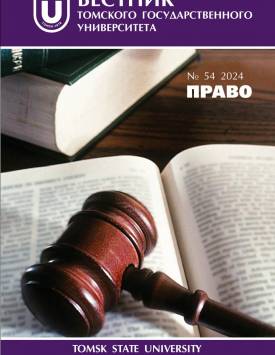Progressive system of serving imprisonment in the light of the results of the Ninth Special Census of Convicts and persons in custody (December 2022)
The progressive system of serving a sentence of imprisonment has gone quite a long way in its development. However, in the current period of time, the effectiveness of the progressive system in penitentiary practice has been significantly reduced. As recorded by the Ninth Special Census of Convicts and Detainees (December 2022), there are trends of desocialisation of convicts and their property stratification. In fact, for a significant proportion of convicts, the positive incentives underlying the progressive system have been devalued. All this should become the object of close attention of penal science, sociology and psychology in order to find other additional incentives for proper behaviour of convicts serving prison sentences. In the doctrine of modern criminal-executive law the progressive system of serving criminal punishment enjoys increased attention of scientists. In relation to imprisonment, this system is understood as a possibility provided by the legislation to change the legal status of the convicted person depending on his behaviour. In this case, two forms of adjustment of the legal status of convicts are distinguished. The first is related to the change in the conditions of serving the deprivation of liberty directly in the correctional institution: ordinary, light and strict conditions in correctional colonies; ordinary, light, strict and favourable conditions in educational colonies; general and strict regime in prisons. The second form consists in the change by the court of the type of correctional institution depending on the behaviour of the convicted person. However, the term itself has not yet been reflected in the Criminal Executive Code of the Russian Federation (hereinafter - CEC of the RF). The heart of the modern progressive system, in our opinion, is the change of conditions of serving the sentence depending on the behaviour of convicts, carried out within the correctional institution. The Penal Enforcement Code of the Russian Federation regulates the grounds, terms and procedure for such a change. In relation to the progressive system of serving imprisonment, the trend of desocialisation is dangerous because it reduces, and for quite a significant part of convicts actually destroys, the stimulating role of changes in the conditions of serving imprisonment. In addition, the results of the Ninth Special Census of convicts and remand prisoners show a deepening of the property stratification of convicts. Thus, from the set of incentives for positive behaviour of quite a significant part of convicts within the framework of the progressive system of serving a sentence, its central link is missing. The desire of the convicted person to improve his behaviour is actually blocked at the subconscious level by the fact that from such improvement the convicted person will not receive additional benefits, regardless of the fact that such benefits are provided by the penal enforcement legislation. The authors declare no conflicts of interests.
Keywords
convict, imprisonment, progressive system, census of convicts, desocialization, property stratification of convictsAuthors
| Name | Organization | |
| Seliverstov Vyacheslav I. | Lomonosov Moscow State University; Moscow State Linguistic University | vis_home@list.ru |
| Zubkova Valentina I. | Lomonosov Moscow State University | office@law.msu.ru |
References

Progressive system of serving imprisonment in the light of the results of the Ninth Special Census of Convicts and persons in custody (December 2022) | Tomsk State University Journal of Law. 2024. № 54. DOI: 10.17223/22253513/54/12
